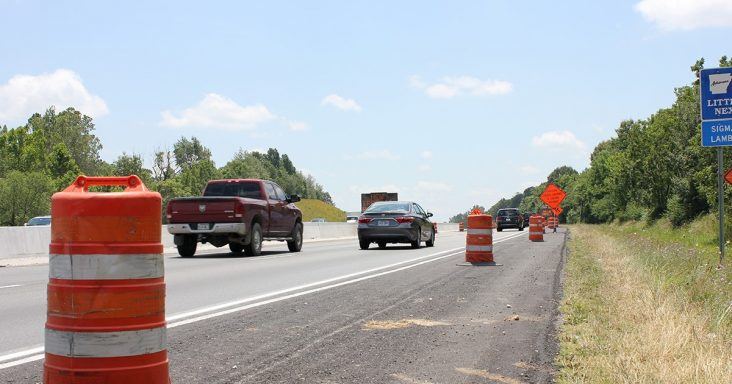Legislators respond to consultant’s view on ArDOT efficiencies
by May 19, 2020 10:49 am 1,917 views

The Arkansas Department of Transportation struggles to compete for talent, does not consider past performance of construction contractors during procurement, and bases maintenance project funding on historical allocations rather than current needs.
Those were some of the findings by Virginia-based consultant Guidehouse that were part of an efficiency review presented last week to the Arkansas Legislative Council’s Highway Commission Review and Advisory Subcommittee.
Guidehouse’s report presented 23 findings, but the presentation focused on 10 key takeaways. The report was produced after the consultant reviewed more than 1,000 documents and interviewed 86 people from September 2019 to February 2020. It also met with the Federal Highway Administration and the Garver engineering firm.
The consultant’s recommendations will be presented during the subcommittee’s next meeting June 17. The chairman, Sen. Jonathan Dismang (R-Searcy) said those recommendations will be where the committee starts its work and determines what’s feasible. He said some responses may require legislation, some might require a partnership with ArDOT, and in some cases ArDOT should make changes on its own.
“We’re going down a road and there are multiple stops and we are just at the findings part of this,” he said. “Please understand, all the information that was gathered was, they did their very best to thoroughly vet that information, and there is no doubt in my mind that ArDOT’s going to have some places that they disagree, that maybe they’ve either started something that Guidehouse wasn’t aware of, or they’re in the middle of something as far as change and that sort of thing.”
Asked to comment about the report, committee member Sen. Jim Hendren (R-Gravette) said it was useful information that hopefully will lead to ArDOT becoming more efficient. Increasing department efficiency was a requirement for legislators to support increasing highway funding during the 2019 legislative session.
“Consultants are never going to report back, ‘Everything looks great,’” Hendren said.
Guidehouse said that, like other state Departments of Transportation, ArDOT struggles to compete for talent with inadequate compensation resulting in high turnover. Staff members value their relationships with managers and their flexible work strategies, but only 53% believe they can advance their career at the department, while 42% agreed that promotions in their division or district go to the most deserving. Only 58% agreed with, “I have all the tools I need to do a great job.” Fifty-four percent said employee retention is important to the department, while 47% said the agency “values its employees.” Trust was higher for managers (74%) than members of the executive leadership team (56%).
About 26% are eligible for retirement in the next 10 years, but ArDOT does not have a policy of hiring retired staff for temporary roles.
Guidehouse’s Sagar Gokhale, who helped present the report to legislators by phone, said the agency risks losing institutional knowledge. Compensation needs to be competitive, and the department needs clearly defined and communicated career pathways. While the labor market has changed since the surveys were taken because of the COVID-19 pandemic, the agency risks finding itself in a similar position when the economy recovers.
The report also said that while ArDOT does have a process for prioritizing construction projects, its public communication related to a project’s status, schedule and budget is “disjointed and inconsistent.” It also doesn’t have a comprehensive process to track and address public comments.
Gokhale said the agency’s maintenance budgeting process is based on historical precedent. ArDOT budgets about $190 million annually for maintenance activities. Those budgets have remained relatively flat and are largely driven by historical budgets rather than considering the features of the roadway system and addressing the greatest needs.
Regarding procurement, Guidehouse found that ArDOT’s governance structure provides it some flexibility, but its methods focus on low bids and don’t consider the past performance of contractors. Gokhale said the system incentivizes delivery to minimum standards, and there is no protocol preventing poor quality contractors from bidding.
“Without a quality assessment, you’re essentially bidding on price and not necessarily on quality,” he said.
The report said that between 2014 and 2019, ARDOT released more than $6 billion in projects with 10 bidders controlling 46% of the value. Staff members said there were problems with contractor workmanship and mitigating disputes, but these were not formally tracked.
The department does use some qualifications-based procurement, which allows it to consider factors in bids other than cost and time for certain projects. However, it lacks formal protocols for deciding when to use certain strategies, and it lacks formal systems to find and implement procurement efficiencies.
Among its other findings, Guidehouse said information technology planning at ArDOT isn’t enterprise-based or enterprise-focused. Divisions can make purchases without review and support of the IT division. There were 10 instances of significant IT spending in 2019 that didn’t involve IT in the decision-making process.
